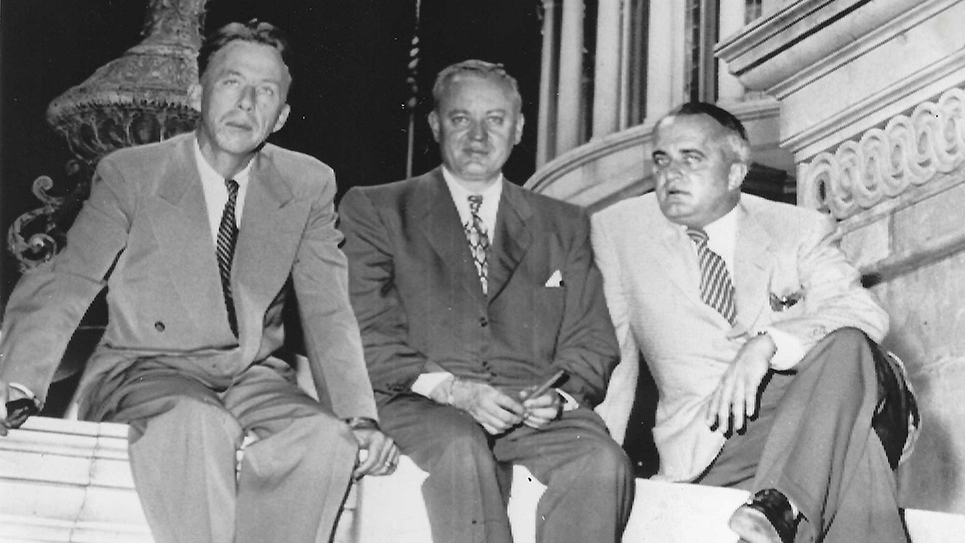
Photo from the author’s personal collection.
Senator Alben Barkley of Kentucky leans forward to talk to a weary President Franklin Roosevelt. Standing in the background, from left to right, are Senator Theodore Francis Green, Secretary of State Cordell Hull, and Eleanor Roosevelt, 1943
The relationship between any two people is usually at least somewhat complicated; between two personalities like Franklin Delano Roosevelt and Alben Barkley of Kentucky, it was especially so.
Barkley, despite not being one of the more senior members of the United States Senate, became one of the most reliable warhorses of the Democratic Party. Famed for his ringing old fashioned oratory, Barkley spoke all across the country for candidates and causes. Barkley also traveled extensively to make paid speeches, as he needed the money. Barkley’s wife, Dorothy, was quite ill and her medical bills mounted. It was not uncommon for Senator Barkley to spend all day in the Senate, hop a train, make a speech and hurry back to the Capitol.
When Franklin D. Roosevelt was elected president in 1932, Alben W. Barkley had been in the United States Senate for six years and had just been reelected to a second term by almost 60% of the vote. Senator Barkley had been chosen personally by Roosevelt to give the keynote address to the Democratic National Convention that same year. Barkley became a frequent keynoter at Democratic conventions.
Barkley loyally supported FDR’s New Deal program and when Majority Leader Joe T. Robinson of Arkansas died at the height of the battle to pass Roosevelt’s proposal to enlarge the U. S. Surpeme Court, the Kentuckian was a candidate to succeed his late colleague.
Becoming Majority Leader was not an easy task for Barkley; he had formidable opposition in the person of Pat Harrison of Mississippi. Harrison had been in the Senate since 1919 and was Chairman of the Finance Committee. Friendly, shrewd, balding with an ever-present cigar in hand, Harrison had the support of many of the more conservative Democrats. Barkley had strong support from many New Deal stalwarts, including his close personal friend, Senator K. D. McKellar of Tennessee.
Harrison’s decision to run for Majority Leader caused President Roosevelt more than a little concern; should Harrison win, he would vacate the chair of the Finance Committee and by seniority that post would fall to Senator William H. King of Utah. Despite being a Democrat, King was quite conservative and profoundly opposed to many aspects of the New Deal. Clearly, FDR would have difficulty in navigating the rapids of the Senate Finance Committee should William H. King become chairman.
Roosevelt was also concerned about his ability to move legislation through the Senate in the event Pat Harrison became Majority Leader. FDR correctly believed Alben Barkley would be a loyal foot soldier and do all he could to help the president; there were signs the New Deal was wearing thin with Pat Harrison. Roosevelt quietly, yet not so discreetly, did his best to help line up support for Barkley’s bid for Majority Leader.
President Roosevelt first sent a letter addressed to “Dear Alben”, urging the Kentucky senator to take up the fight where Joe Robinson left off. FDR’s intent was lost on no one.
Both candidates were, like all human beings, flawed; Barkley was not especially highly regarded by many of his colleagues while Pat Harrison had a reputation for being somewhat lazy, although the Mississippi senator was highly personally popular with his colleagues and carried enormous influence in Washington.
The election of a new majority leader came down to the vote of Senator Theodore G. Bilbo of Mississippi. Being Pat Harrison’s colleague, one would think Bilbo would have voted for his fellow Mississippian. Yet Bilbo and Harrison were neither personally or politically friendly. Bilbo, barely 5’2 inches tall, was known as “The Man” in Mississippi; he had been elected governor twice in nonconsecutive elections and had toppled an incumbent to win election to the Senate. Bilbo was a fiery speaker and a devoted New Dealer. Those who heard him speak said he seemed ten feet tall on the stump.
Harrison’s constituency in Mississippi was far different from that of Bilbo. Harrison retained the support of the Delta planters, businessmen, and the middle class. Bilbo was the spokesman of the “rednecks” and an unabashed populist. Bilbo’s support of FDR and the New Deal was unwavering and absolute.
Desperate for votes, Senator James F. Byrnes of South Carolina approached Bilbo who chewed his own ever-present black cigar and said he would vote for his colleague if Harrison asked him personally. When told of the conversation, Pat Harrison bellowed, “You tell that son-of-a-bitch I wouldn’t speak to him if it meant the Presidency of the United States!”
Alben W. Barkley was elected Majority Leader by a single vote.
Barkley later recalled in his memoirs that the tension in the Senate Caucus Room was so intense he bit the stem of his pipe in two.
Bilbo chortled to one correspondent Harrison had been beaten by one vote – his and proclaimed himself to be “the boy who killed Cock Robin.”
Roosevelt was pleased by Barkley’s election and would back the Kentuckian the next year when Barkley faced a stiff challenge inside the Democratic primary from Governor A. B. “Happy” Chandler. Barkley’s reelection was one of the few bright spots politically for FDR in 1938 in an otherwise dismal election season.
While Barkley had achieved his goal of becoming Majority Leader of the United States Senate, many senators believed the Kentuckian was more the spokesman of Franklin D. Roosevelt in the Senate than that of his fellow Democrats. Barkley suffered from ill treatment by much of the press and not a few of his colleagues.
Pat Harrison had his own revenge by helping to finally kill off Roosevelt’s court packing bill. Barkley was even left standing speechless and profoundly embarrassed when the Senate ignored his objections and instead followed the lead of Charles McNary, the Republican leader (and there were all of sixteen Republicans in the Senate at the time) to adjourn.
Scorned by many of his own party, who derisively referred to him as “Dear Alben”, Barkley received more than a few rebuffs from his colleagues and when he tired of a filibuster in 1943, the Majority Leader ordered the Senate Sergeant At Arms to arrest several recalcitrant Democrats who were absenting themselves. One of the offenders was Tennessee’s Senator Kenneth D. McKellar.
Mark Trice, Assistant to the Sergeant At Arms, astonished by Barkley’s command, murmured, “Do you mean Senator McKellar, too?”
“I mean everybody!” Barkley roared.
Sergeant At Arms Chesley W. Jurney was at least smart enough not to go to arrest the ornery Senator McKellar personally. He sent Mark Trice instead. McKellar refused to answer his telephone and Trice convinced a maid to knock on the door to McKellar’s suite at the Mayflower Hotel. The feminine voice lured the Tennessean to the door and while he seemed surprised to see Trice, he agreed to accompany him back to the Capitol. Trice recalled that McKellar was quite pleasant on the drive to the Capitol until the senator saw the lights and it dawned upon him why he had been summoned. McKellar shot out of the limousine to search the corridors of the Capitol to see who was responsible for his summons.
Alben Barkley suffered the wrath of Senator McKellar and despite the fact they sat beside one another on the Senate floor, the Tennessean absolutely refused to speak to the Majority Leader. They had been warm personal friends and President Roosevelt was advised Barkley was depressed by McKellar’s refusal to speak to him.
Barkley also had to endure McKellar denouncing him on the floor of the Senate. McKellar had recommended Barkley for a place on the U. S. Supreme Court, a recommendation he publicly withdrew.
Barkley had suffered many humiliations for Roosevelt’s support and winning his office by a single vote. He established his independence on February 23, 1944. After laboring long and hard to pass President Roosevelt’s tax bill, he was astonished when FDR vetoed the legislation. Roosevelt said the bill was “not for the needy, but for the greedy.” Considering that Senator Barkley had not only strongly supported the bill, but did more to pass it than anyone else in the Senate, the long-suffering Kentuckian had had enough. Barkley took the floor of the Senate and blistered the hide off FDR. At the conclusion of his speech, Barkley resigned as Majority Leader.
McKellar delightedly cried, “I forgive him everything! I forgive him everything he’s ever done!”
The Democrats caucused and promptly reelected Alben W. Barkley as Majority Leader.
Bellowing, “Make way for liberty!” Texas Senator Tom Connally barreled through the halls of the Senate Office Building to notify Barkley he had been reelected.
Senator Elbert Thomas of Utah made the point with Barkley’s reelection as Majority Leader that he had been the president’s spokesman in the Senate, now he would speak to FDR “for us.”
Barkley’s rebellion earned him the respect of his colleagues, but it may well have cost him the presidency. Alben Barkley very much wanted to be President of the United States and was considered to be an ideal running mate for a weary Franklin Roosevelt in 1944. It was clear to just about everybody in Washington that Roosevelt would dump Vice President Henry A. Wallace from the ticket that year; in fact, the only person who seemed not to realize it was Henry Wallace.
A host of potential candidates sought FDR’s endorsement or, at the very least, his approval to run for the vice presidential nomination. Roosevelt encouraged everyone and even issued a statement saying, were he a delegate at the Democratic National Convention, he would vote for Henry Wallace. Alben Barkley stood by and watched as the vice presidential nod went to an obscure senator from Missouri, Harry S. Truman.
Four years later, President Truman selected Alben W. Barkley to run with him in a campaign nobody thought the feisty little man from Missouri could win. Alben Barkley became Vice President of the United States. Barkley’s wife had died and much of the country watched with interest and amusement as the “Veep” (it was one of Barkley’s grandchildren who coined the word) courted a much younger widow. Ms. Hadley accepted Barkley’s proposal and the two were married November 18, 1949. Barkley was seventy-one, while the bride was thirty-seven.
Jane Hadley had been a staunch Republican before marrying Vice President Barkley, having worked in the 1940 campaign of GOP presidential candidate Wendell Willkie. Apparently the two reached a successful bipartisan accord.
Barkley gave his new bride a new Oldsmobile convertible as a wedding present.
At seventy-four, Barkley’s presidential ambitions had not dimmed in the least and he briefly sought the presidential nomination of the party he had worked so hard for over decades. It was a bitter disappointment when Barkley was told he was thought to be too old by the kingmakers at the 1952 Democratic National Convention. Barkley assumed the status of an elder statesman and celebrity. Barkley and his wife hosted a television show for a short period of time, but politics was never far from his mind.
Barkley returned to his native Kentucky and ran for the United States Senate once again in 1954 and defeated incumbent Republican John Sherman Cooper. At age seventy-six, Alben W. Barkley returned to the Senate as a freshman senator.
Alben Barkley died as he lived; he literally died from a sudden heart attack in the middle of a speech at a mock convention at Washington and Lee University in 1956. Barkley referred to his seat on the back row of the United States Senate and spoke his last words on this earth: “I’m glad to sit on the back row, for I would rather be a servant in the House of the Lord than to sit in the seats of the mighty.”
Barkley then collapsed and died.
Alben Barkley’s estate was apparently a tangled affair and the senator had evidently not paid income taxes in years. Mrs. Barkley wrote a memoir of her life with Barkley and worked as a secretary at George Washington University. She died in 1964 at age fifty-two.






